Washington Weighs in on Cuba
Washington Weighs in on Cuba
Days ahead of the Summit of the Americas, the White House eased Cuba restrictions, making it easier for Cuban Americans to travel to the island and send remittances to family members there. The changes also allow for more humanitarian aid and bids by U.S. telecommunication firms.
Updated April 13 - A trip by seven members of the Congressional Black Caucus to Havana put U.S.-Cuban relations in the spotlight as hemispheric leaders prepared to meet at the Summit of the Americas. The delegation, led by U.S. Representative Barbara Lee (D-CA), met with the Castro brothers in separate meetings, marking the first official U.S. visits since President Raúl Castro took office last year and for former President Fidel Castro since 2006.
The visit came just before as President Barack Obama turned back restrictions (read a White House fact sheet) for Cuban Americans wishing to visit or send money to family back on the island. Fulfilling a presidential campaign promise, Obama took the action before the Summit of the Americas, which runs April 17 to 19 in Trinidad and Tobago and will serve as the new president’s introduction to many Latin American leaders and, thereby, the hemisphere. Relaxing the restrictions could affect an estimated 1.5 million Americans with family members in Cuba, calculates The Wall Street Journal. El País reports that Cubans hopes to experience an increased inflow of somewhere between $300 million and $500 million as a result of the change.
The changes will also allow U.S. telecommunications firms to bid for licenses on the island as well as for a freer flow of humanitarian goods.
American legislators have gone a step further. Bipartisan proposals making their way through both houses of U.S. Congress seek to lift the travel ban for all Americans. Senators Byron Dorgan (D-ND) and Michael Enzi (R-WY) introduced the Freedom to Travel to Cuba Act. A similar bill in the House drew 120 co-sponsors and calls for allowing Americans “to exercise their right to travel to Cuba.” Another House bill seeks to ease restrictions on selling agricultural products to Cuba.
Washington’s moves on Cuba could end up being a focal point at the Summit, much to the chagrin of the White House. “In a way, we believe it would be unfortunate if the principal theme of this meeting turned out to be Cuba,” says Ambassador Jeffrey Davidow, the White House advisor for the summit. Yet, as The Economist suggests in an article about the upcoming conference, the uninvited Cuba could end up being the 800-pound gorilla in the room.
Latin American leaders expressed their support to end the 47-year-old U.S. embargo in a December summit held in Brazil. “I am unable to understand the continued blockade of Cuba. It doesn't make any sense,” said Brazilian President Luiz Inácio Lula da Silva. Reinstatement of Cuba into the Organization of American states (Havana was suspended in 1962) could be another proposal that comes up in Port of Spain. “It has turned out that we are the isolated country,” said Rep. Emanuel Cleaver (D-MO) after returning from Cuba on Tuesday.
Some of the warm steps from Washington have drawn optimism in Havana, including from Fidel. In his weekly column, the octogenarian former leader detailed his meeting with the U.S. lawmakers and hailed the visit, making reference to the historical nature of Obama’s electoral win.
But human rights on the island remains a thorny issue, prompting criticism of the congressional delegation to Cuba. A Washington Post editorial decries that fact that lawmakers didn’t meet with political dissidents in jail or visit their families. “The black U.S. lawmakers’ concerns weren't for the 300-plus Cuban prisoners of conscience listed by Amnesty International or the hundreds of dissidents working from their homes under the watch of a totalitarian regime,” writes Miami Herald columnist Myriam Marquez.
With all the buzz about U.S.-Cuban ties and power shifts in Havana, are changes underfoot in Cuba? As one man interviewed in Havana put it to the New York Times, “Politics here is a sport whose spectators are all blind. Everyone knows things are happening. No one is sure what. So you stop trying to watch.”
Read AS/COA analysis of the recent reshuffling of Raúl Castro’s cabinet.








